

Strategy, Ideology and the Close of the Syrian Crisis. By George Friedman It is said that when famed Austrian diplomat Klemens von Metternich heard of the death of the Turkish ambassador, he said, "I wonder what he meant by that?
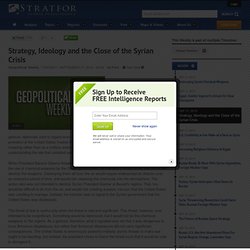
" True or not, serious or a joke, it points out a problem of diplomacy. In searching for the meaning behind every gesture, diplomats start to regard every action merely as a gesture. In the past month, the president of the United States treated the act of bombing Syria as a gesture intended to convey meaning rather than as a military action intended to achieve some specific end. This is the key to understanding the tale that unfolded over the past month. When President Barack Obama threatened military action in retaliation for what he claimed was the use of chemical weapons by the Syrian government, he intended a limited strike that would not destroy the weapons. The threat of war is useful only when the threat is real and significant. Avoiding Military Action.
Transcript of the Interview by the Foreign Minister of Russia S.Lavrov to the Foreign Policy Magazine, published on April 29, 2013 » International Affairs. Question: Minister Lavrov, thank you so much for taking the time.
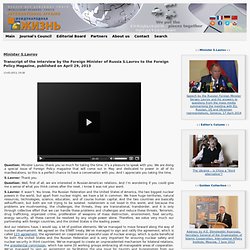
It’s a pleasure to speak with you. We are doing a special issue of Foreign Policy magazine that will come out in May and dedicated to power in all of its manifestations, so this is a perfect chance to have a conversation with you. And I appreciate you taking the time. S.Lavrov: Thank you. Question: Well, first of all, we are interested in Russian-American relations. S.Lavrov: It wasn’t. And our relations have, I would say, a lot of positive elements. I would also refer to the cultural cooperation.
Of course the relationship between such big countries can never be cloudless. There are other problems which negatively affect the relationship between Russia and the United States. Question: Although you say that Americans expected a response, which of course they did, but they were surprised -- and it seems even many Russians were surprised -- by the specifics of the Russian response. With Iraqi Arms Deal, Russia Fills Void Left by the US. Russian President Vladimir Putin (R) welcomes Iraqi Prime Minister Nouri al-Maliki in his Novo-Ogaryovo residence outside Moscow October 10, 2012.
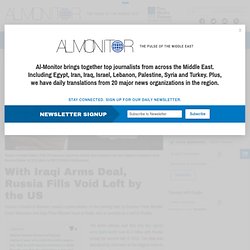
(photo by REUTERS/Kirril Kudryavtsev) Author: Azzaman (Iraq) Posted October 10, 2012 Russia’s Council of Ministers issued a press release on the meeting held by Russian Prime Minister Dmitri Medvedev and Iraqi Prime Minister Nouri al-Maliki, who is currently on a visit to Russia. Summary⎙ Print Relations between Moscow and Baghdad continue to warm with a multi-billion-dollar weapons deal. Nidal al-Laythi examines how Russia is quietly filling the void left by the United States in Iraqi arms supplies. Author Nidal al-Laythi Posted October 10, 2012 Translator(s)Naria Tanoukhi The press release said that Iraq has signed arms deals worth over $4.2 billion with Russia during the second half of 2012. It marks the biggest single weapons transaction Moscow has conducted for 30 years, except for deals with Algeria and Venezuela. Pomruki przyszłej wojny. Nie przestaje mnie zdumiewać, że w mediach tak mało uwagi poświęca się rosnącemu na naszych oczach z każdym dniem prawdopodobieństwu wybuchu wojny lub serii wojen na Bliskich Wschodzie.
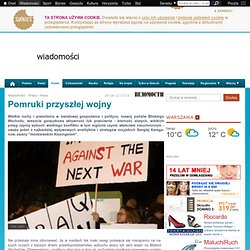
Obserwatorzy i analitycy, idąc trop w trop za zachodnimi środkami masowego przekazu, z których zwykli czerpać większość informacji, oceniają kryzys za kryzysem, nie usiłując nawet nakreślić spójnego obrazu. Tymczasem wiele czynników makrogeopolitycznych i makrogeoekonomicznych zdaje się przesądzać o konflikcie, szczególnie fakt, że tak prędko nastąpiło "nowe rozdanie" w dziedzinie wpływów i sił, faworyzujące szczególnie kraje azjatyckie. Conjoncture : G20 : les 5 surprises du communiqué final. DÉCRYPTAGE - Si la crise de l'euro a occupé le premier rang des préoccupations à Los Cabos, le G20 a avalisé pour la première fois la politique de change chinoise et évoque une sorte de Schengen à l'échelle mondiale.
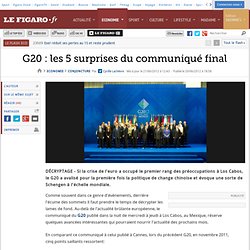
Comme souvent dans ce genre d'événements, derrière l'écume des sommets il faut prendre le temps de décrypter les lames de fond. Au-delà de l'actualité brûlante européenne, le communiqué du G20 publié dans la nuit de mercredi à jeudi à Los Cabos, au Mexique, réserve quelques avancées intéressantes qui pourraient nourrir l'actualité des prochains mois. En comparant ce communiqué à celui publié à Cannes, lors du précédent G20, en novembre 2011, cinq points saillants ressortent: 1. La place prise par la zone euro est désormais centrale. En outre, cette fois, c'est l'Espagne qui est citée, alors que l'Italie occupait le devant de la scène fin 2011: «Nous saluons le plan de l'Espagne pour recapitaliser son système bancaire», expliquent les vingt pays les plus riches de la planète.
Czas chaosu. Koszmar ludzi ze "śmierdzącej" kategorii. Wielka rewolucja kulturalna w Chinach była jednym z najbardziej krwawych okresów w nowożytnej historii.

Wielki ruch społeczno-polityczny, zainicjowany przez Mao Zedonga, kosztował życie 40 milionów osób. Prof. Góralczyk dla Onetu: Chiny zastawiły na świat pułapkę. Piotr Gruszka: Chiny przez ostatnie lata rozwijają się w ogromnym tempie.
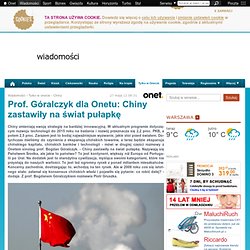
Caucasus. Journals, Research Institutes.